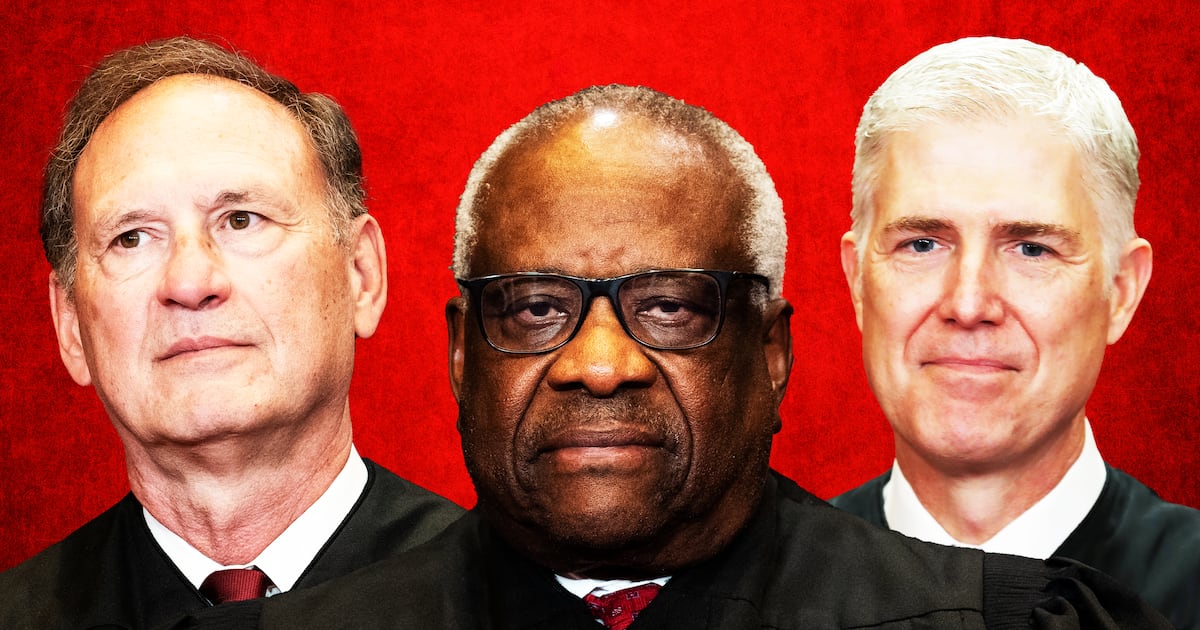For several hours on Wednesday, the U.S. House was frozen as Republicans tried to lock down the necessary votes to advance an immigration and border-focused bill.
The fundamental challenge for Speaker Kevin McCarthy (R-CA) was the same as always: with just a four-seat majority in the House, faced with unanimous Democratic opposition and persistent rebellion from his right flank, he could afford to lose virtually no votes.
This time, however, McCarthy could not turn to his most problematic ally for a precious yes vote—because that ally was in federal court in New York being arraigned on 13 criminal charges.
ADVERTISEMENT
For Republicans, the presence of Rep. George Santos (R-N.Y.) in their ranks has been uncomfortable from the moment journalists started exposing his web of falsehoods. But his absence from a critical day of legislative business underscored the potential costs to GOP leadership of his long-term absence—which might be the most uncomfortable Santos development yet.
“McCarthy is in the middle because he needs George Santos’ vote to stay Speaker,” said Rep. Robert Garcia (D-CA), who has led a legislative effort to expel Santos. “I think most folks on the Republican side want him out. My guess is Kevin McCarthy wants him gone. He’s in a political bind he’s put himself in.”
Ultimately, Republicans passed the border bill without Santos. But the tense episode illustrated just one of the many calculations that House Republicans, from the top of the party to the rank and file, are grappling with as they weigh how to handle their indicted colleague.
With Santos decrying the serious charges as a “witch hunt” and vowing to go nowhere, the options available to House Republicans are all fraught in some way.
They could decide to expel Santos from Congress—a move that would certainly not upset a growing number of GOP lawmakers who have called for his resignation. To those vocal lawmakers, it’s obvious that Santos’ immediate departure is the only move that will begin putting their association with him in the rearview mirror and minimize the political liability he could pose to the party.“I think he needs to go right away, and I hope that he resigns,” Rep. Nick LaLota (R-N.Y.), another Long Island Republican, told CNN. “He’s a complete embarrassment.”
But if Santos did resign, a special election would be held in his district—which Joe Biden carried in 2020. A Democrat would be favored to win, permanently cutting into the House GOP’s margins.
Alternatively, Republicans could pursue a middle-ground strategy laid out by McCarthy. The Speaker hasn’t called on Santos to resign, but he also said on Wednesday night he won’t support his re-election bid and would ask for his resignation if the House Ethics Committee found he broke the law.
This more middle-of-the-road posture, in theory, allows lawmakers to keep their distance from the New York congressman while Santos continues about his Capitol Hill business—and continues to be a cushion on key votes.
While many GOP lawmakers are exasperated with Santos and would like to see him go, the emerging consensus seems to be that the trial should play out before any action is taken.
Rep. Dusty Johnson (R-SD) noted to The Daily Beast that, when members have been indicted in the past, they have not resigned or been expelled until their trials conclude.
“I'm certainly not a fan of having George Santos in Congress. I don't think he adds anything,” Johnson said. “But that being said, the standard approach, when either party has been in control of either chamber of Congress for decades, has been that people are innocent until they're proven guilty… I think it might well take a different fact set to get a different outcome.”
Most indicted members have been sanctioned in the past by stepping down from their committees. Santos has already stepped down from his posts. He did so almost immediately after being sworn into office in January.
Which is to say, congressional life might not look all that different for Santos. He has been a high-profile pariah even before he arrived on Capitol Hill, and some Republicans have said since the beginning of his tenure that he should resign. There may be more voices in that chorus, and Santos will have serious crimes hanging over his head, but he may be able to continue voting for GOP priorities until he’s actually convicted.
A small number of GOP lawmakers remain sympathetic toward Santos. Rep. Tim Burchett (R-TN), who made an effort to befriend the embattled New Yorker, told The Daily Beast when asked, “innocent until proven guilty—as much as everything is stacked up against him right now.”
Burchett added that he’d “like to talk to George.”
“I haven’t seen him yet,” he said.
Democrats, however, are determined not to let McCarthy and Republicans off easy every day that Santos remains in their ranks. They argue that Santos’ case is so extreme that the past standards for handling indicted members should not apply.
On Wednesday evening, Garcia told The Daily Beast 10 new cosponsors have signed on in the 24 hours since the indictment news broke on Tuesday.
“He's clearly a fraud and a liar, has no business getting classified information from being in the Congress, and so we're going to continue to keep the pressure on,” Garcia said. “It’s only going to get worse for him from here.”
The last sitting member of Congress to be charged with crimes was former Rep. Jeff Fortenberry (R-NE), who was indicted in Oct. 2021 on three charges of lying to the FBI and concealing facts surrounding an investigation into potential foreign campaign contributions. In May 2022, Fortenberry was convicted, at which point McCarthy, as well as then-Speaker Nancy Pelosi (D-CA), called on him to resign, which Fortenberry promptly did.
Santos might be more inclined to follow the example of a different recently indicted lawmaker—at least partially. In Aug. 2018, former Rep. Chris Collins (R-NY) was charged with insider trading. Collins quickly announced he would suspend his re-election campaign, but the following month, a defiant Collins reversed course, and ended up narrowly winning another term in November.
Last month, Santos officially launched his re-election campaign, and gave no indication on Wednesday that he was backing down. But even though Collins—the first member of Congress to endorse then-candidate Donald Trump for president—won another term, he wasn’t long for Congress anyway: he resigned in Sept. 2019 after entering a guilty plea with prosecutors.
(He was ultimately pardoned by Trump, along with the second member of Congress to endorse Trump, Duncan Hunter Jr., who pleaded guilty of stealing hundreds of thousands of dollars from his campaign.)
Still, one fact hangs over the embattled freshman congressman: any member can force a vote on expelling Santos—in effect putting every member on the record—by offering a certain motion and forcing Republicans to table that motion with a recorded vote.
"A number of members are complaining that McCarthy won't put an expulsion resolution on the floor,” Matt Glassman, a senior fellow at Georgetown’s Government Affairs Institute, noted to The Daily Beast. “The Speaker may be blocking an expulsion politically by not supporting it, but he can't block it procedurally. Any member can unilaterally get an expulsion resolution on the floor as a Question of Privilege."









